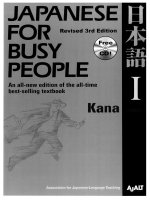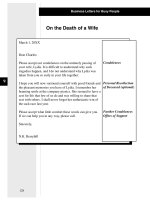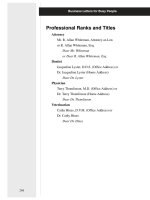JAPANESE FOR BUSY PEOPLE 7 doc
Bạn đang xem bản rút gọn của tài liệu. Xem và tải ngay bản đầy đủ của tài liệu tại đây (2.48 MB, 30 trang )
LESSON
16
THE NEW SHOWROOM DESIGN
+i$kLIf +i\I3Z"
iliqyf
il+
IiC
Mr. Yamakawa asks Mr. Hayashi on the phone if he likes the new
design for the showroom.
Yamakawa: Hello, is this Mr. Hayashi? This is Yamakawa of the M Design Office. We have fin-
ished the showroom design you requested.
Hayashi:
Ah,
yes. We received the blueprint by fax (just) a little while ago. It looks quite
good to me.
Yamakawa:
Are there any problems? If (we) start construction work next week, it'll be fin-
ished by the end of next month.
Hayashi:
I
see.
Yamakawa: If there are no problems we'd
like to start without delay.
Hayashi: As it gets near the end of the year, contractors get
(quite) busy, don't they?
Yamakawa: Yes. The earlier the better, I
think.
Hayashi: I'm afraid we'd prefer to meet (you) and have one more consultation before (you)
start.
Yamakawa: I understand. If you
have tirne, 1'11 come (over) now.
Hayashi: If you
can, please do so. The front entrance is closed at six (lit. "when it gets to be
six"). If you go around to the opposite side, there's a back entrance. Please come
in that way.
Yamakawa: Yes, of
couse.
Hayashi: The back entrance is open unti1 ten o'clock.
I'U
be expecting you then. (lit. "I
request you to
iactl properly.")
CI
Vocabulary
design, plan
someone else's request, commission
showroom
be
finished/ready/done
blueprint, plan
(polite form of
&
b
i
\
2
L
t:)
some-Ianything, some, any
construction work
=
if
without delay, directly
end of the year
contractor, supplier,
trader, businessman
if
.
.
.
-er/more/less, (then)
.
.
.
visit, ask (polite)
when (particle)
front, face, surface
be closed
li
L t:
i
\ficb
opposite side
iiLt:ii
opposite, reverse
-+C+,
side
i
b(s
back entrance
i
6
back, reverse (side)
a6L(
properly, well, at one's discretion
The
Ifilifi
li
form is calied the conditional form and is made with verbs, the two types
of adjectives, and nouns as shown below. Note also the negatives (in which practice is
given
in
the Exercises in this lesson).
178
GRAMMAR
&
LESSON OBJECTWES
/
@,'firbm
E3
i
(Reg.
I)
h'
t
tì
4
la'
is found in written Japanese and is a forma1 way of speaking.
To see the conditional in relation to other forms, refer to the verb table in Appendix
B.
I2
l3r
tìadj.
noun
aitwa'
at\iir<
t\[\
li
T-
li
T-
This pattern uses the conditional form of an
t
\
adjective with the dictionary form of the
same adjective plus
li
Y"
and leads to a conclusion.
ex.
h
?
l? &lf
h
?
t
\li
Y"
t \t
\T-$,
"The larger the better."
h h
aff.
,Ftà
la'
For
tì
adjectives the pattern is
$dx
?i
4
I*d"b li
Y*
t
i
t
\
Tt
"The quieter the better."
neg.
,%.htìititzla'
h
t
iL'Itì
i$
Essentially the same pattern consists of the conditional form of a verb and the dictionary
form of the
same verb with
li
Y"
coming after it.
ex.
Ritzla'
Rb
iar'
ia
L
<
tì
l)
3
t:
"The more (I) look at (it), the more (I) want it."
(<L
'l
TAitzla')
<L')
tìb (lf)
/f<7f:
b
(rTfiT &&la')
ha
atì
4
(la')
,'t:-, t:
4
h4
Particle
Z
+L'l
T/
L'++tì~t&lf
fiT/
L'
rtìititzlf
ha
lfLf:t\d'hI:
b
i
4~d'
&i)
$t2
i
h
,
\"
A clause endmg with
Y
followed by a main clause with a present form is a way of saying
if
or when
A
happens,
B
occurs as a natura1 or habitual result. The sense is often "when-
ever." Two points to remember are that
Y
comes after the dictionary or plain negative
form of a verb, and this pattern is not appropriate for expressing one's
own requests,
suggestions, intentions, or the granting of permission. Specifically, it is not used in sen-
tences ending in
7
<
f:?
t
\.
3
L
a
i,
3 tfLdx
and so on.
ex.
l.
f
t
L
i
d
L
T
C
Y
,
<
4
<
tì
"I
3
tc
"When the sun sets, it gets dark."
"If you push this button, the
machine will (start) running."
Y
,
t:
b,
?A'
b
and
la'
are in some cases interchangeable, as when they are translated by
"if," but there are rules and restrictions in the usage of each word. Please refer to the
grarnmar sections on each one.
GRAMMAR
&
LESSON OBJECTIVES
179
,,+
This word refers to traders, suppliers, and manufacturers who provide goods and ser-
vices to larger enterprises and government organizations. It can be compared with
Y
i)
V
'i
%,
which implies a more equa1 relationship.
I?
2.
q*
ilX
i
7
The fina1 few days in December have traditionally been regarded as the period for fin-
ishing the year's business or settling accounts. This feeling still pervades society, even
though the fiscal year for the vast
rnajority of companies now extends from Apri1 to
March. People do their best to clear up any
outstanding problems within the year so
that they
can relax during the New Year's holidays.
CI
KEY
SENTENCES
1.
1s there any beer?
No. there isn't, but
if
I
call the liquor store they'll bring some over right away.
2.
When spring comes, the cherry blossoms come out.
3.
As for fish, the fresher the better.
d
Vocabulary
%%
spring
i:
6
'r
<
blossom, flower
I
Verbs: Study the examples, convert into the conditional form, and memorize.
ex.
i'?
<
+i"irf
[a‘,
4'il5-~[f
&la‘
&G~-+&~~LIX,
+fili
t:
*a-*ktrw,
;tcai+h[f
-cta fk~ir,
L
~itk~lr
<
&,'?,V
180
NOTES
I1
Practice the following patterns by changing the underlined parts as in the
example given.
ex.
$4
,R&T
l
30%
d\d\'j &To
*
3
.;.L
3.
RI:
GBBW
aa.
C
I
4r.r
aa
9
L
0.X
4.
gr4dZ
1)
a
L
z
)27
KWI
aa
L?LX
h
5.
[a,
5
1)
~a-ti~.
bdx')
a-ti~
I11
Adjectives: Study the example, convert into the conditional form, and memorize.
ex.
&?t
\-&71?)2If,
$57
<
tìl?)2lf
IV
Practice the following patterns by changing the underlined parts as in the
examples given.
A.
ex.
Slfit2lf
Rt\&Bd',
&l$$.rIf
Rl\$-tiLo
'?-T
h'
t:+
EXERCISES
1
8
1
IL
V
Make dialogues
by
changing the underlined parts as in the examples given.
A.
ex.
A:
A$-'Y
9
371:
A')
&-t)L-t/\O
li
i
B:
&(jkCIf
A
1)
i
\
Y
\
&
T,
X
?
%
3,
C
C
6.
$4
a<
d\l;
i#i\7i\&+
h:
li?
h
B.
ex.
EElq.;.IìX,:
hid't:t
737-93-1:
I73&+-t/\,
1
+-
3
x
i
x.;,IìX,:
V&$<
hkCIf
$7C&+,
VI
Make dialogues
by
changing the underlined parts as in the examples given.
A.
ex.
A:
glSkClf
l-
i\r\T+ka,
L
:r
li?
182
EXERCISES
-
p=eil
asn
jo
aae~ue~pe aye~
'jo
asn ayew
e&t&
Lpeap
(I
S
"TI
&+l;
L\\
rare, unusual
?ai)
a little, few
b
\
not delicious
(from) early
Mrs., lady, woman
flower show
baby sitter
be found, find
husband
(house) rent
salary
right
in
front of
(lit.
"in
front of your eyes")
cancer
button
push
put
in
go out, be extinguished, put out
lever
pd
sound
turn
A: Oh dear, it's 10:30 already. It looks like
(1%)
be
late for the plane.
B: 1% take (you) (lit. "send you off") to the airport by car. If (we) hurry, you'll be
in
time.
A: Thank you. (lit.
"If
it is not too much trouble for you to do so, please do so.")
184
SHORT
DIALOGUE
P
rclb,c-
Ci
Vocabulary
l$'
f:\\+k
Oh
dear!
y!lz!5
?J
be inlon tirne
$5
take, seelsend
off,
escort
C@\
\h
<
trouble,
inconveniente
pp ~-~~p~p-~
I
Read this lesson's Opening Dialogue and answer the following questions.
4.
ABCO
i
bali
1.7eI:
Q~Y
1)
&Itdxo
(5
L
I1
Put the appropriate word or word parts
in
the parentheses.
III
Complete the questions so that they fit the answers.
QUIZ
185
I
I
(4-3
Y4
.43
W)
"Cf
(1.5
>4'!\Q4
2x1
(
)
TI
(
)
.o1
Y
7.1
<4P$Zc# '4$Y@=4) "-k-P\12
2
(
)
'.TI
(
)
.!l%%
'6
(4PGZCH '4.2-\\lfl)
"G
PlP
(
)
A'-?
',e]
(
)
'8
(4Vl3)
"4-3
(l
P€#
>QL.iI
A
(
)
3
'L
'SWJOJ
JII~~.]/J)
qayi oiu! saari3alp~ pui? sqJaa 3upiolloj ayi iJaauo3
AI
'L
L81
IINVX
MBN



![japanese for busy people 2 [kana version]](https://media.store123doc.com/images/document/14/rc/my/medium_mye1395897198.jpg)





